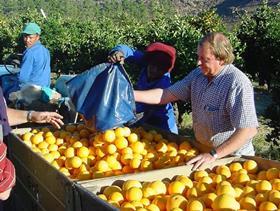
European citrus marketing representatives and Northern and Southern Hemisphere suppliers participated in a global teleconference last week to discuss market conditions, with the consensus that most market reports made for poor reading.
Despite the fact that the supply of citrus into the market has been well balanced, participants said, reduced demand has resulted in build up of stocks and a decrease in prices.
The global teleconference featured marketing representatives in Belgium, Germany, France, Italy, UK and Spain, as well as Northern Hemisphere supplier countries Spain, Turkey, Italy, Egypt and Morocco and Southern Hemisphere suppliers South Africa, Argentina, Peru and Australia.
Following the meeting, the South African Citrus Growers’ Association (CGA) told its members that market conditions had been affected by the abundant supply of summer fruit. 'You have a global citrus market which is under huge pressure,' said CGA CEO Justin Chadwick.
Referring to the effect of European summer fruit, he said that apricot volumes had increased 12 per cent, with peach and nectarine volumes up by 7 per cent compared with last year.
'Stocks of apples are 50 per cent higher than the same time last year,' Mr Chadwick said. 'These products and other competing fruit are selling at very low prices, sometimes not covering the cost of production.
'The bad news continues with the strengthening of currencies in the UK and Russia, and the impact of the global economic slowdown,' he added. 'Buyers are reducing risk by reducing stock holdings and buying only when they can move the product. Buyers are also putting pressure on suppliers in terms of price – they want to buy cheap so they can sell at attractive prices. Prices for many commodities have dropped by 20-25 per cent from last year's levels.'
He said the consensus was that for grapefruit, it would be a year to forget. 'There are reports of a 60 per cent decrease in sales volumes – influenced both by lower supply and the weather,' Mr Chadwick noted. 'The weather in Europe has been more conducive for the consumption of summer fruit. Grapefruit prices are reported to be 20-25 per cent lower than 2008.'
According to the report, the European lemon market is not in a much better state. 'Spain reported that they still have lots of lemons on the trees, and that they will be marketing their Verna right through to the first week in August,' he said. 'The UK reported fair demand and there are no reports off a market crash at present.
“Soft citrus proved to be the only product with a silver lining,' Mr Chadwick explained. 'The market reports were more positive, with the UK reporting good demand and prices for soft citrus. Southern Hemisphere countries also reported a satisfactory to good soft citrus campaign.'
He said that the negative news for oranges was that storerooms in Spain are full of late season Valencias, with an abundance of small-sized fruit. 'Orange prices are at very low levels, but, despite that, consumption levels are not great due to warm weather and competing summer fruit. Consumption of oranges is down 25 per cent.'



